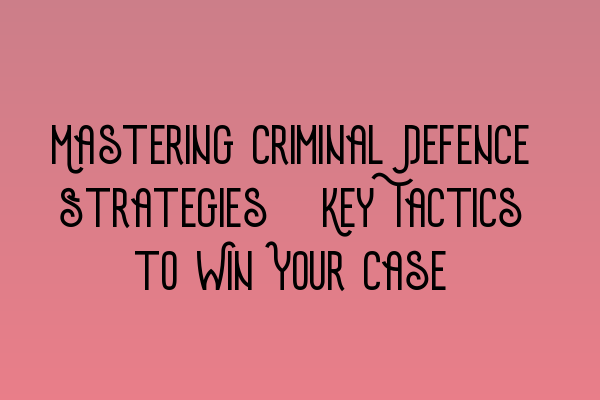Mastering Criminal Defence Strategies: Key Tactics to Win Your Case
When it comes to criminal law cases, having effective defence strategies is paramount to achieving a favorable outcome. Whether you are a criminal defence lawyer preparing for the SQE 1 exam or a practitioner seeking to enhance your skills, this article will provide you with invaluable insights into mastering criminal defence strategies.
The Importance of Understanding Criminal Law
Before delving into defence strategies, it is essential to have a solid understanding of criminal law. A comprehensive grasp of the legal principles and elements of various crimes is crucial to building a robust defence. If you need to brush up your knowledge, consider taking SQE 1 preparation courses that cover criminal law extensively.
Key Tactics for Building a Strong Defence
1. Thorough Case Analysis: To develop an effective defence strategy, it is essential to conduct a thorough analysis of the case. This involves reviewing the evidence, identifying any inconsistencies or gaps, and assessing the legal issues at hand. By dissecting every aspect of the case, you can identify potential weaknesses in the prosecution’s case and build a strong defence.
2. Expert Witness Testimony: Expert witnesses can play a crucial role in supporting your defence. They provide specialized knowledge and opinions that can debunk the prosecution’s evidence or cast doubt on their theories. Ensure you have access to reputable experts who can testify on relevant scientific, forensic, or technical matters.
3. Cross-Examination Techniques: The art of cross-examination is a fundamental skill for any criminal defence lawyer. Mastering the ability to question witnesses effectively can expose contradictions, inconsistencies, or biases in their testimonies. By using strategic questioning techniques, you can weaken the prosecution’s case and strengthen your defence.
4. Creative Use of Defences: Criminal defence strategies often involve creative thinking and applying defences in unconventional ways. Exploring all available defences and finding innovative ways to argue them is key to challenging the prosecution’s case. Familiarize yourself with various defences such as self-defence, duress, necessity, or mistaken identity, and assess their applicability to your specific case.
Continuous Learning and Preparation
Criminal law is a dynamic field that constantly evolves. Staying up-to-date with legal developments, landmark cases, and changes in legislation is crucial for an effective defence. Engaging in continuous learning and taking SQE 2 preparation courses will equip you with the necessary knowledge and skills to navigate the complexities of criminal law.
Furthermore, honing your advocacy skills through regular practice and participation in mock trials or SQE 1 practice mocks will enhance your courtroom performance and confidence. Remember that preparation is a cornerstone of successful defence strategies.
Conclusion
Mastering criminal defence strategies is a continuous process that requires a solid foundation in criminal law, strategic thinking, and continuous learning. By employing thorough case analysis, leveraging expert witnesses, utilizing effective cross-examination techniques, and exploring creative defences, you can maximize your chances of winning your case.
